- Home
- Hermann Hesse
Hymn to Old Age Page 2
Hymn to Old Age Read online
Page 2
Sometimes the endless golden stillness seems
Accompanied by music sweet and pleasant
Until the world awakens from its dreams
Returning to the living, breathing present.
We old ones stand and pluck fruit from the bough
With hands well warmed and summer-sun-burned brown.
The day still smiles, the sun has not gone down
And we still revel in the here and now.
THE OLD DAYS
IN MY HOMETOWN LIVES an old schoolteacher—one of the good ones—who writes to me once a year. He goes on living quietly and contemplatively in his little hermitage with garden, and when someone is buried in the town it’s generally one of his former pupils. This old gentleman recently wrote to me again. And although I have a totally different opinion from his, and contradicted him vehemently in my response, nevertheless his views on the old days and the present seem to me well worth reading, and so I shall reproduce this extract from his letter. He writes—
… I can’t help thinking that the present world is separated from that which still existed effectively in my youth by a greater gulf than that which normally separates the generations. I can’t know it for sure, and history seems to teach us that my view is an error to which every ageing generation is prone. For the flow of progress is constant, and at all times the fathers are overtaken by the sons and can no longer make themselves understood. And yet I cannot change my feeling that—at least in our nation and country—during the last few decades everything has changed much more radically, as if our history has accelerated far more swiftly than in former times.
Shall I tell you what seems to me the most fundamental aspect of this revolution in the Zeitgeist? In a nutshell, I sense a ubiquitous decline in respect and in modesty. I don’t wish to sing the praises of the old days. I know that in every age there has been just a small proportion of good and useful things, one thinker for every thousand talkers, one true believer for every thousand of the soulless, one gentleman for every philistine. Perhaps basically there were no individual matters that were better then than now. But on the whole it seems to me that until a few decades ago there was in our general way of life more decency, more modesty than today. Now everything is done with far more noise and far more self-love, and the world resounds with the certainty that it stands on the threshold of a Golden Age, whereas in fact no one is happy.
All around people talk, preach and write about science, culture, beauty, personality! But awareness that all these valuable things can only thrive in silence and can only grow in the night seems to have disappeared completely. Every branch of knowledge and learning is in such a hurry to bear fruit immediately, and to see concrete and successful results.
Knowledge of a natural law, which in itself is such a sublime, internal event, is rushed with questionable haste into practice—as if one could accelerate the growth of a tree once one had fathomed out the law governing its growth. And so everywhere people are burrowing round the roots, experimenting and exploiting the work, and that makes me suspicious. Neither for scholars nor for poets is there anything left that people are prepared to remain silent about. Everything is discussed, laid bare, illuminated, and every study wishes immediately to take on the status of knowledge. A new fact, a new discovery has already been popularised and exploited by the newspapers even before the researcher has finished his work. And every little snippet of information gleaned by the anatomist or the zoologist immediately has the arts trembling with fear! A particular statistic influences the philosophers, a microscopic discovery changes the spiritual teaching of the theologists. And in no time you also have an author writing a novel about it. And those old, sacred questions about the roots of our existence are currently material for entertainment, affected and influenced by every breeze of fashion in the arts and sciences. There seems no longer to be any silence, any ability to wait, or any distinction between big and small.
That is how it is in visible daily life. Rules for living, health guidance, forms of houses and furniture and other items for long-term use which used to be endowed with a certain stability change as swiftly today as clothing fashions. Every year people have reached the peak of every subject—they’ve achieved the ultimate. In the lives of individual families it all leads to a great gulf between the inside and the outside, between the facade and the interior, and hence to a decline in ethics and in the art of living, whose basic feature is an astonishing lack of fantasy.
It seems to me almost as if this is the real disease of our time. Fantasy is the mother of contentment, of humour, of the art of living. And fantasy can only flourish on the foundations of an inner understanding between man and his material surroundings. These surroundings need not be beautiful, nor strange, nor charming. We just need the time to integrate with them, and that is what is missing everywhere today. Anyone who wears nothing but brand-new clothes which he has to change and renew as often as possible will thereby lose a piece of the ground on which fantasy rests. He doesn’t know how alive, lovely, friendly, amusing, exciting and full of memories an old hat, an old pair of riding breeches, an old waistcoat can be. And it’s the same with an old table and chair, a tried and trusted old cupboard, fire screen, bootjack. And the cup you’ve drunk from since childhood, grandfather’s chest of drawers, the old clock!
Of course you don’t have to go on living in the same place in the same rooms with the same objects. Someone can live his whole life travelling and without a home and yet still be blessed with the richest imagination. But he too will certainly carry some favourite item around with him, from which he will never allow himself to be separated, even if it’s only a ring, a pocket watch, an old knife or wallet.
But I’m digressing. I just wanted to say that this hankering after change makes people poorer and does damage to the soul by encouraging dislike of stability, whether it be in one’s world view or in one’s household objects; it becomes difficult for children to write, create, cope with material things if they are confronted with an overabundance of toys and picture books. And it becomes difficult for adults to adhere to any belief, to hold on to any inner conviction if every stall can make things easily and cheaply available to them that should be acquired slowly and through their own dedication. Now everyone thinks he must grab hold of everything, and there is nothing easier for him than to switch from the Church to godlessness, from there to Darwin, from him to Buddha, and from him to Nietzsche or Haeckel or whoever else, without needing to make much effort or do much studying. It has become so easy to know without having to learn.
Of course this will not bring about the end of mankind. And of course today as always there are those good-hearted, hard-working folk who turn their backs on the easy ways and cheap successes. But it has become more difficult for them. As has life in general, in which the average level of culture both at home and at work has fallen. It may have seemed trivial and silly in the old days when many family men pursued their pleasant hobbies, when one played the flute, another practised calligraphy, or took watches to pieces and put them back together again, or made models out of paper and cardboard. But such things did no harm and people were happy. And even if for the genius, for the individual with great aspirations, an ever thirsty discontent is necessary and even beneficial, for the vast majority of lesser folk, contentment is no less necessary and no less beneficial if things are to remain in balance.
In former times families and even wider communities shared intimate memories, were attached to little things in the outside world which went on exerting a powerful inner influence and gave rise to a wonderful feeling of home. There was recognition of tiny connections which must have been dangerous for men of reason, but for men of fantasy was a source of inner relatedness and also a treasure trove for jokes and cheerfulness. There were so many ‘characters’, because people enjoyed little oddities and took note of them, and as this was the practice on all sides, it created a tone of merriment and goodwill in communication and conversation. Of course
even today every real family has its own tone, its secrets, its forms of teasing and its own particular language, and that will always be the case. But beyond the confines of the family, for the most part modern societies lack such colour and cheerfulness, and this lack of contentment cannot be replaced by expensive clothes and meals …
This was what my old teacher wrote to me. As I said, I don’t share all his views. But it seems to me he does have a point.
1907
FROM TIME TO TIME
When suddenly I find unfurled
A memory of childhood times
It’s like some legendary world
Transfigured by a poet’s rhymes.
In silence then my gaze must sink
Weighed down by times so bright and blessed
And I can only sit and think
Like one by heavy guilt oppressed.
ON A HEALTH CURE
SCARCELY HAD MY TRAIN arrived in Baden, and scarcely had I managed with some difficulty to climb down the carriage steps, when the magic of Baden revealed itself to me. Standing on the wet concrete platform, peering around for the hotel porter, I saw three or four fellow patients getting out of the same train that I had been on, all suffering from sciatica, as was clearly visible from the tremulous clenching of the buttocks, the halting gait and the somewhat helpless, pained facial expressions that accompanied every cautious movement. Each of them had his own speciality, his own variety of suffering, and hence his own way of walking, of hesitating, of hobbling, of limping, and each had his own form of grimace, but the predominant factor was what they had in common—I could see at a glance that all of them were sciatica sufferers, my colleagues, my brothers. Anyone who knows the games played by the nervus sciaticus—not by way of the medical handbook but from the personal experience which doctors call ‘subjective sensation’—will understand exactly what I mean. I stopped in my tracks and gazed at these marked men. Lo and behold, all three or four were pulling faces worse than mine, were leaning more heavily on their sticks, flexing their hams more twitchily, treading more warily and fearfully—they were all more agonised, miserable, ailing and pitiful than me, and this did me a great deal of good, and remained a constantly recurring, inexhaustible source of comfort to me throughout my stay in Baden—everywhere you looked, there were people limping, people crawling, people sighing, people in wheelchairs, and they were far sicker than I was, and had far less reason for good humour and hope than I had! And so during the very first minute of my stay I had discovered one of the great secrets and magic potions of all health resorts, and I savoured my discovery with true delight—the Pain Cooperative Movement, the socios habere malorum.
When I left the platform and cheerfully tackled the gently sloping street that led down towards the baths in the valley, every step confirmed and enhanced this invaluable experience—patients were creeping and crawling everywhere, or sitting bent and weary on the green painted benches, or hobbling along in chattering groups. A woman was being pushed in a wheelchair, letting out a tired laugh, with a half-withered flower in her limp hand, while behind her, bursting with energy, strode her blossoming female carer. An elderly gentleman came out of one of the shops where rheumatics buy their postcards, ashtrays and paperweights (they need a lot of those, though I never found out why)—and this elderly gentleman who came out of the shop needed a minute to negotiate every step, and he looked at the road ahead of him like a man at the very end of his tether, suddenly confronted by a huge and unexpected task. A young man wearing a grey-green military cap on his bristly head was vigorously manipulating two sticks, though he could still scarcely move. Oh, those sticks, which were here, there and everywhere, those damnable, deadly serious sticks, which ended in rubber tips at the bottom and sucked on the asphalt like leeches or babes at the nipple! I too used a stick, a stylish malacca cane, whose support was most welcome, although if necessary I could also walk without it, but no one had ever seen me with one of those miserable rubber-tipped suckers. No, it must have been obvious to all who saw me how swiftly and athletically I sailed down this pleasant street, how infrequently but playfully I wielded my malacca cane—merely an ornament, a decorative accessory—how very slight and harmless was that characteristic sign of sciatica in me, the agonised clenching of the upper thigh, perhaps just hinted at, like the most rudimentary sketch, and how smoothly and elegantly I trod this path, how young and healthy I was compared with all these older, poorer, sicker brothers and sisters, whose afflictions revealed themselves so clearly, so undisguisedly, so relentlessly! From every step I drew their recognition, savoured their acknowledgement, and I felt almost fully fit, or at least infinitely less unfit than all these poor folk. Indeed, if these half-crippled hobblers could still hope to be cured, these rubber-tipped stick-walkers, if Baden could still help them, then my little beginner’s pains must disappear like snow in the foehn, and in me the doctor would see a shining example, a phenomenon to give thanks for, a small miracle of curability.
Well, I enjoyed the pleasures of this first day to the very full, indulging in orgies of naive self-congratulation, and it was all highly beneficial. Drawn by the ubiquitous figures of my fellow patients, my less fortunate brothers, flattered by the sight of every cripple, inspired to joyful sympathy and empathetic self-satisfaction by every approaching wheelchair, I strolled down the street—that oh so cosily, comfortingly designed street, along which guests arriving from the station are wheeled to the baths, and which curves gently with a pleasant, even slope down to those ancient baths, thence to disappear like a dried-up riverbed into the entrances of the spa’s hotels. Filled with good intentions and happy hopes, I approached the Heiligenhof, where I expected my journey to end. The idea was to spend three or four weeks here, taking the baths each day, walking as much as possible, and avoiding as much as possible all sources of anxiety and excitement. Perhaps it would occasionally become monotonous, and indeed it could hardly pass without periods of boredom, because the prescription here was the exact opposite of the high life, and for me—the old recluse deeply and painfully averse to any sort of domestic or hotel living—there would be a few problems to cope with, a few obstacles to overcome. But without a doubt this new, completely unfamiliar life, despite its perhaps rather bourgeois, rather soft-centred character, would bring me some interesting and entertaining experiences. And was it not high time that after years of living in primitive peace, in rural isolation, absorbed in my studies, I now spent some hours with my fellow humans again? And the main thing was that beyond the obstacles, beyond the now beginning weeks of treatment, lay the day on which I would make my sprightly way up this same pretty street, would leave behind these hotels and, healed and rejuvenated with elastically flexible knees and hips, would bid farewell to Baden as I danced my way to the station.
1923
A LESSON
Every word men speak, you may presume
Is more or less a fraud because, my dear,
You’ll find us humans at our most sincere
Wrapped in our nappies, later in our tomb.
Then we are wise at last, and all is plain.
We join our fathers down below the ground
And with bare bones we rattle truth around
Though some would rather lie and live again.
THE FERRYMAN
WHEN HE REACHED THE ferry, the boat was ready and the same ferryman who had once taken the young samana across the river was standing in the boat; Siddhartha recognised him, though he too had aged considerably.
“Will you take me across?” he asked.
The ferryman, surprised to see such a distinguished gentleman wandering alone and on foot, helped him into the boat and cast off.
“You have chosen a fine life for yourself,” said the passenger. “It must be nice living each day beside the water and travelling across it.”
With a smile the oarsman rocked back and forth.
“It is fine, sir, it is indeed, as you say. But is not every life and every job nice?”
/> “That may be so. But I envy you yours.”
“Oh, you would soon cease to enjoy it. It’s nothing for people in fine clothing.”
Siddhartha laughed. “I have already been noticed once today because of my clothes, and looked at with suspicion. Will you not, ferryman, take these clothes from me, as I am tired of them? For you should know that I have no money with which to pay the fare.”
“The gentleman is joking,” laughed the ferryman.
“I am not joking, my friend. Look, you have already taken me in your boat across the water once before, just for love. So do it again today, and take my clothes as payment.”
“And does the gentleman intend to journey on without clothes?”
“Oh, I should like best not to journey on at all. I should like best, ferryman, for you to give me an old overall and to keep me on as your assistant, or rather as your apprentice, for first I must learn how to handle the boat.”
For a long time the ferryman gazed enquiringly at the stranger.
“Now I know who you are,” he said at last. “Once you slept in my hut, a long time ago, it may well be more than twenty years ago, and I took you across the river, and we parted as good friends. Were you not a samana? I can’t remember your name now.”
“My name is Siddhartha, and I was a samana when you last saw me.”
“Then you are welcome, Siddhartha. My name is Vasudeva. You will, I hope, be my guest today as well and sleep in my hut, and tell me where you have come from and why you are so tired of your fine clothes.”
They had reached the middle of the river, and Vasudeva pulled harder on the oars in order to make headway against the current. He worked in silence, his eyes fixed on the tip of the boat, his arms moving powerfully. Siddhartha sat and watched him, and recalled how long ago, on that last day of his time as a samana, love for this man had risen in his heart. Gratefully he accepted Vasudeva’s invitation. When they reached the bank of the river, he helped him to tie the boat to the stakes, and then the ferryman invited him to enter his hut, offered him bread and water, and Siddhartha ate with pleasure, and with pleasure he also ate the mangoes which Vasudeva offered him.

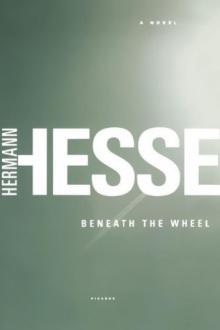 Beneath the Wheel
Beneath the Wheel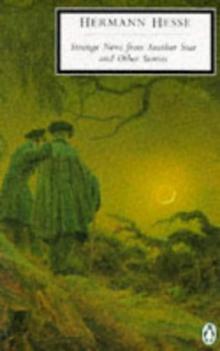 Strange News From Another Star
Strange News From Another Star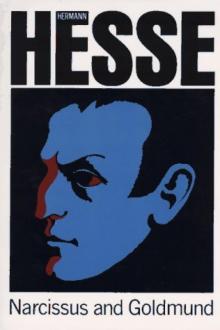 Narcissus and Goldmund
Narcissus and Goldmund Steppenwolf
Steppenwolf Siddhartha
Siddhartha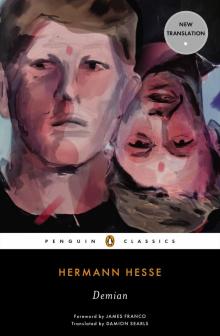 Demian
Demian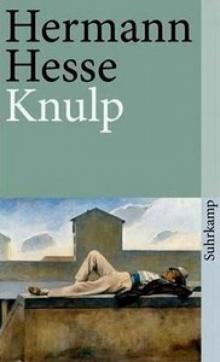 Knulp
Knulp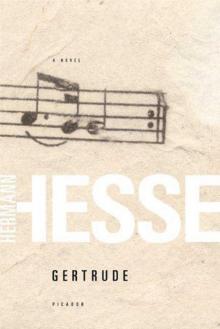 Gertrude
Gertrude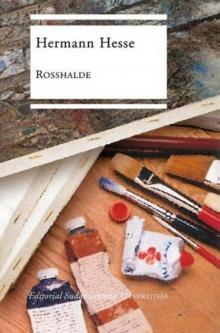 Rosshalde
Rosshalde The Glass Bead Game
The Glass Bead Game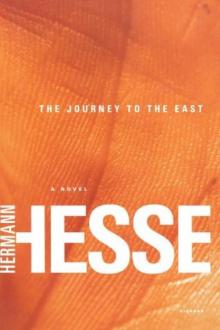 The Journey to the East
The Journey to the East Klingsor's Last Summer
Klingsor's Last Summer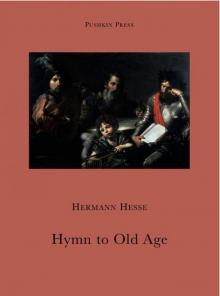 Hymn to Old Age
Hymn to Old Age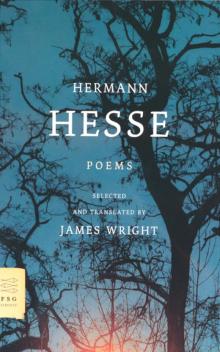 Poems
Poems The Fairy Tales of Hermann Hesse
The Fairy Tales of Hermann Hesse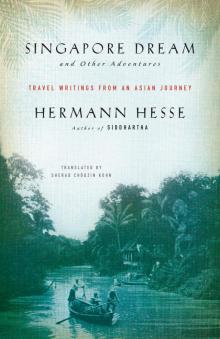 Singapore Dream and Other Adventures
Singapore Dream and Other Adventures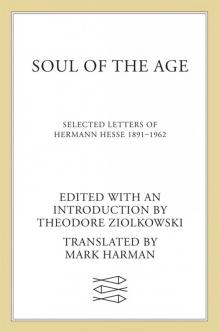 Soul of the Age
Soul of the Age